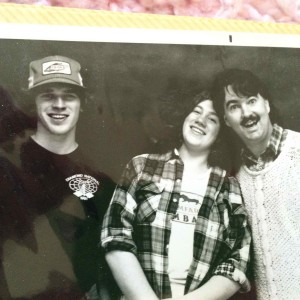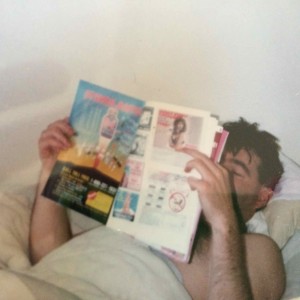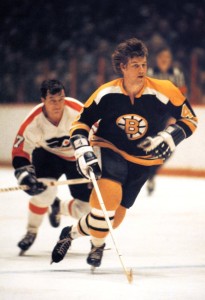Almost 30 years on, it’s hard to believe Marty is the one being roasted in the Guelph newspaper, where he’s the executive director of the Downtown Guelph Business Association, and I’m unemployed, coaching hockey and hanging out at the beach (with a PhD).
 Marty was always the front man, quick with a quip, as shown in the story below, and I was the asshole who enforced deadlines. Nona more so.
Marty was always the front man, quick with a quip, as shown in the story below, and I was the asshole who enforced deadlines. Nona more so.
Back in 1988, after we’d all quit the official student newspaper – I was editor – we started up our own paper at the University of Guelph. And at some point there was a federal election, and I told Marty, you should run as the Rhino candidate. Good PR.
I’ll always remember the skinnier, younger versions of ourselves, and it was a good time.
The story below explains it better:
They would nationalize Tim Hortons, repeal the law of gravity and promote higher education by building taller schools.
Ah yes, the Rhinoceros Party of Canada — the only party to promise not to keep any of its promises — is back for another kick at a federal election, and at federal candidates. For almost 40 years, Rhino candidates have used satire and pranksterism to lampoon the political process.
It’s been 27 years since a Rhino ran for election in Guelph. Back in 1988, a federal election was too rich a target for Marty Williams, who was Guelph’s last would-be Rhino MP.
“For me, it was improv comedy,” says Williams, who is now the executive director of the Downtown Guelph Business Association. “I grew up reading Mad Magazine. Poking holes in the pompous came naturally to me.”
 (Marty, left as I usually saw him when a column was due). Williams recalls that it wasn’t really his idea to become a Rhino candidate. The notion was proposed by two friends while he was a student at the University of Guelph. “I said, ‘Yeah, yeah, stop bugging me,’ and by the time I got back to the campus, they had organized a press conference. I was interviewed by the local media and it got on CBC radio.
(Marty, left as I usually saw him when a column was due). Williams recalls that it wasn’t really his idea to become a Rhino candidate. The notion was proposed by two friends while he was a student at the University of Guelph. “I said, ‘Yeah, yeah, stop bugging me,’ and by the time I got back to the campus, they had organized a press conference. I was interviewed by the local media and it got on CBC radio.
“It was silly fun. Our defence policy was to bring back Bobby Orr and we wanted to have Free Trade vacations with people in Mexico . . . in February. Good for us, not so good for them.”
Back in 1988, says Williams, it only cost $200 to register as a candidate, and the party needed 50 candidates across the country to be a registered party on the ballot.
“For $200, it was a good glimpse into how politics works at the local level. I was invited to all the debates and everybody was asked the same questions.”
Williams said that he particularly enjoyed the debates at high schools. “Most of them were too young to vote, but it’s about trying to engage them in the issues.” Williams said that the students responded when “someone could take a question and have some fun with it. It’s more fulfilling to take a satiric slant when you know something about what you’re talking about.”
The debates weren’t all about riffing off the headlines, though. “At the time, there was still apartheid in South Africa, and we were asked a question about apartheid. When it was my turn to respond, I said that some things just aren’t funny, and I got a round of applause for that.”
For the 1988 election, there were 74 Rhino candidates across Canada. For the 2015 election, there are (at last count) just seven, and none in Guelph or area. In the age of satiric political talk shows, are the Rhinos still relevant?
“How could we have possibly thought in 1988 that a political candidate would be caught on camera swearing at reporters? … Peeing in a cup? How could you even make that up?
“What would you be talking about (in this election) that is conventional wisdom that should be stood on its head?,” Williams said.
And the sources for political satire are many and varied today: “Visual evidence of people behaving badly can be circulated around the world in a blink of the eye. With memes and posters, everyone becomes a satirist in this day and age.
“It was much more somber and polite (in decades past). It was more of an ‘old boys’ network back then,” and thus easier to lampoon. “That seems like such an innocent age now.”
In 1988, Williams finished seventh of eight candidates with 240 votes. “I’m amazed I got that many … even I didn’t vote for myself.”
Part of his work with the Downtown Guelph Business Association is to encourage small businesspeople and property owners to engage with the federal election. Williams says that many people don’t see a federal election as a “local” issue.
“The Federation of Canadian Municipalities has put out a good position paper. The federal government has the levers and the ability to do a lot for cities, including a small city like Guelph.”
As for this election, Williams hopes all eligible Guelphites will vote. “If you think about every admirable country in the world — lowest poverty rates, best treatment of women or minorities — those are countries with governments that were chosen by voters.
“The cynical can say that your vote doesn’t matter, but the places where people participate are the best ones. Anarchy has not proven to be a book for personkind. The best places in the world are where people get out to vote.”
Below is an op-ed we wrote and it may have gotten published. I never read my own work once it’s published, onto the next thing.
The Rhino constitutional process
A referendum? Seven provinces or 50 per cent of the population? An election? The Rhinoceros Party recently came up with a better way to improve the country’s constitutional competitivenes, one that is deeply rooted in the Canadian psyche: a round-robin hockey tournament.
 The tourney opened in ritualistic Canadian style, with Maureen Forrester singing the Canadian national anthem. Don Getty followed with the French version while Eric Lindros performed an interpretive ice dance of the DeGaulle classic, Viva Quebec Libre. In justifying his performance, Mr. Lindros, back from the Albertville Olympics said, “Hey, I’m just like every other Canadian. I don’t mind playing in front of the French as long as the Americans are watching.”
The tourney opened in ritualistic Canadian style, with Maureen Forrester singing the Canadian national anthem. Don Getty followed with the French version while Eric Lindros performed an interpretive ice dance of the DeGaulle classic, Viva Quebec Libre. In justifying his performance, Mr. Lindros, back from the Albertville Olympics said, “Hey, I’m just like every other Canadian. I don’t mind playing in front of the French as long as the Americans are watching.”
The games featured the best political ice skaters from each special interest group and province — Quebec, Ontario, Alberta and Minnesota (they’re so distinct they’re from a different country).
The Reproductive Technologies team was disqualified in its first game for failing to wear protective cups. The ordinary Canadians team was also eliminated for insisting on playing in Ea-Z-Boy recliners and using short-wave radio frequencies to direct the puck from hand-held remote controls.
The Manitoba team, featuring the Axworthy line (which is difficult to understand but easy to get through), adopted a defensive style of play, and spent most of their game explaining why it’s not their fault. They lost to the Saskatchewan team featuring Roy Romanov, the golden jet of the tourney, who one day hopes he will be so famous that Oliver Stone will make a movie about him.
The New Brunswick team, after refusing to play against an opposition, finally capitulated and easily defeated the Confederation of Regions team who had an overabundance of right-wingers.
The B.C. team was distracted because captain Mike Harcourt was preoccupied with his intense endorsement schedule for the Hockey Helmet Club for Men. “I’m not just a premier, I’m also a client,” said Harcourt for the fawning Newsworld anchors. Regardless, the team’s hopes were undermined by malcontents when B.C. goaltender Bill Vander Zalm sold the net to a Hong Kong business-type, who thought he was buying Annette Funichello. Vander Zalm will appear in a Hong Kong court after the Chinese take over.
The Newfoundland team was easy pickings for the Missing Link team from P.E.I. because star Clyde Wells was out in the parking lot letting the air out of everybody’s tires and stuffing tailpipes with cod. When asked about the old “Newfie cod up the tailpipe trick”, PEI captain Joe Ghiz responded, “No, my eyebrows are just bushy.”
Following the precedent set by the former U.S.S.R., two new teams were added to the tourney. The Prairie unified team was constructed so Manitoba could receive welfare payments from Alberta instead of Ottawa, while the Atlantic-unified team was convened to reroute welfare from Ottawa to Maine-based Irving Oil.
The Yukon team spent most of their first game in the dressing room when favorite daughter, NDP leader Audrey McLaughlin, dropped by to say a few words. The team emerged inspired but was unable to overcome the 224-0 deficit.
A crowd favorite was the Triple-E Senate team, featuring the high-scoring line of Eddie Shack, Eddie Johnson and Eddie Giacoman. Just like the Senate, they were fun to watch but highly ineffective.
Quebec GM Claude Ryan finally dealt Eric Lindros to where all Quebecers think he belongs: the North West Territories. “See the endorsements you get in Inuvik,” said an enthused Ryan.
During the Dairy Farmers versus the Canadian Book Publishers game, the “No Whey” team was accused of simply milking the publicity by fielding a marketing-board approved 3.8 players and then refusing to play the third period. “We were cheesed off,” said coach Eugene Whelan.
The tourney was so successful that Bob White was thinking of cloning the technique for the next round of labor negotiations at the Oshawa car plants. “I can hardly wait for the union workers to play the GM all-executive team,” said White.
However, just when it had appeared the Rhino party of Canada had achieved consensus where other parties had failed, Ovrid Mercredi insisted on a bingo tournament where the caller fires appropriately labelled lacrosse balls into the crowd, modeled after the democratic native decision-making process. Newfoundland insisted on a fishing derby and Manitoba demanded a curling bonspiel. The tournament adjourned lacking a clear winner, but Mercredi’s suggestions were thought to hold potential for Senate reform.
Marty Williams and Douglas Powell were the candidate and campaign manager for the Rhino Party in the riding of Guelph in the 1988 federal election.
